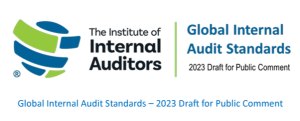One of the many duties of the Clerk is to function as the Auditor for the County. As reported in June, The Institute of Internal Auditors (IIA) – the internal audit profession’s leader in standards, certifications, education, research, and technical guidance worldwide – released a draft of their proposed Global Internal Audit Standards earlier this year. These new standards are due to be finalized by the end of 2023.

The new Standard 10.3 specifies the requirements of technological resources for an internal audit function, noting that the function “should use technology to improve its effectiveness and efficiency. Examples of such technology include:
- Audit management systems
- Process mapping applications
- Tools that assist with data science and analytics
- Tools that assist with communication and collaboration.”
Three members of the Clerk’s Office of Inspector General (OIG) recently joined with 16 other counties and municipalities as founding members of the Analytics Audit Network of Florida, whose mission is to “to cultivate a community of auditors who possess comprehensive knowledge and proficiency in data analytics, enabling them to apply these skills to local government auditing.” The objectives of the group are as follows:
- To learn about the enhanced concepts and principles of data analytics
- To explore the potential applications of data analytics in local government auditing
- To share best practices and lessons learned in implementing data analytics in local government auditing
- To network with other professionals in the field and build a community of like-minded individuals interested in data analytics
Last month, the Pinellas County Inspector General’s office demonstrated some of their techniques for searching for potential fraud in grant applications. The Clerk’s OIG had adopted many of these practices, and we isolated some additional data fields to capture to refine our analyses.
Data analytics allow auditors to “zoom in” on red flags in 100% of the population, versus making general conclusions by utilizing a statistical sample which represents a small portion of the entire population. The Clerk’s OIG employs two inspectors who are certified in data analytics, and they routinely perform sophisticated analyses to search for non-compliance, potential fraud, and other outliers for further review.

